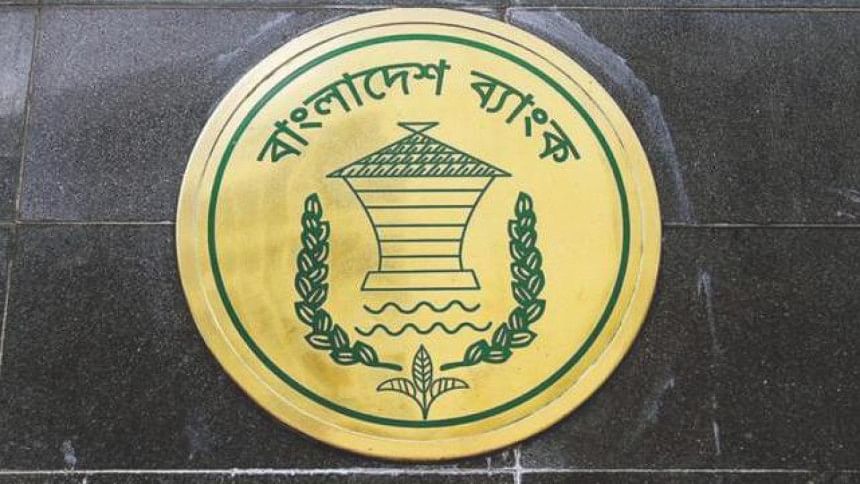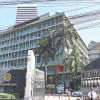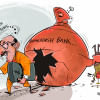Who is BB fooling?

Two things come easy in Bangladesh -- getting big bank loans and blissfully failing to repay. The money in the vaults seems to be the easiest prey today.
In the last ten years, scam after scam in the banks has rocked our financial sector, each and every scam unique and more spectacular than the previous ones. The banks looked like sandcastles suddenly being washed away by a bevy of businessmen.
There were outcries and warnings from think-tanks to individuals about the state of affairs happening in the banks. Media were awash with the stories hardly to any effect.
When such was the state of the banking sector, a recent Bangladesh Bank report highlighting the central bank's success in the last ten years that completely ignored the lack of governance in the financial world came as a shock for two reasons – either the regulator does not recognise the weakness and malaise plaguing the banks or that it has taken it for granted that such things are commonplace and so deserve no special mention. In other words, the Bangladesh Bank has dusts off its hands.
But from the regulator, a more honest assessment of the situation is expected if the flaws are to be corrected and malaise treated. Sadly, the report seems to be more written with political exigency rather than with real urgency and professionalism.
How the central bank conducts its core business today will explain why the report looks so frail.
Hallmark is truly a hallmark in the banking scam of the last ten years.
The group had taken out Tk 2,686 crore with fake documents from Sonali Bank in collusion with officials. Another about a thousand crore taka was embezzled in similar fashion by five other companies.
The story of BASIC Bank, one of the best in Bangladesh, is known to all. From a very success story, that too in public sector, the bank took a nose dive as over Tk 4,000 crore were robbed from it through all kinds of irregularities. That the bank was being defrauded was known to all, it was in the air, and in several media reports including in The Daily Star only the Bangladesh Bank remained silent until the whole robbing process was complete.
Bismillah Group had done in five banks by embezzling Tk 1,100 crore and nothing has happened after that.
And then there is the scam of Crescent and AnonTex involving more than Tk 8,000 crore; and the list goes on. There is the case of how cash incentives were taken out with fake documents with the central bank officials' collusion.
And then there was the scam at Farmers' bank, a new entrant. Its chairman Mohiuddin Khan Alamgir stepped down as a result of the Tk 500 crore scam. But matters ended there as if a mere resignation settles the issue.
The central bank is also in a quandary about what to do with the large loans restructured as a special case. Many of these loans have defaulted and rescheduled again and again.
Actually, the lack of governance has led to spiking of non-performing loans (NPL) to 10.41 percent in June, a very high and unsustainable level, from 9.21 in 2009 when the government came to power. This is despite massive write-off of loans.
And all these have taken toll on the borrowers and general shareholders. Banks' cost of fund had gone up leading to a high interest rate regime.
In the stock market, at least five of the banks are trading below their face values and five others just at face value. Earning per share of the banks has dropped dramatically, some by 10 times.
The hollowed-out state-owned banks needed capital to survive and we the taxpayers were compelled to fork out crores.
From fiscal 2005-06 to 2016-17, they received Tk 10,272 crore in capital support. In other words, we gave the money to the cheats and swindlers.
And yet capital shortfall at the banks stood around Tk 22,000 crore in March this year.
The central bank also showed its lack of independence when applying its monetary tools. At the insistence of the bank owners who faced liquidity crunch, the central bank reduced requirement of the banks to keep cash with the central bank by one percentage point. This was no independent conscious decision of the Bangladesh Bank as it should have been.
Defying the market force, the bank owners in return promised that they would reduce lending rate to single digits, something that did not happen yet.
While things were in such a mess, there were talks of bank merger. Even the finance minister had said some smaller banks should get merged with the big ones. That did not happen though, after all bank mergers are done to make banks stronger and not weaker. A strong bank with some lacking in one area merges with another strong bank to make up the deficiency. Why should a strong bank snap up a sick bank? It makes no economic sense.
And just as an oxymoron, the Bangladesh Bank is mulling giving licences to four more banks just on political diktat. With 57 commercial banks in place, Bangladesh has the second highest number of banks second only to Ukraine within the GDP bracket of $114 billion and $198 billion.
There are many more holes showing glaringly in the Bangladesh Bank that need to be plugged standing on a sound assessment of its strengths and weaknesses. A mere back-patting report that serves no other purpose than the political one will not help the case. The Bangladesh Bank is the regulator but as it seems it is turning a blind eye to all irregularities. Being the custodian of banks, it holds all responsibilities if anything bad happens to the banking sector. Its ostrich policy will not exonerate it from the blame.

 For all latest news, follow The Daily Star's Google News channel.
For all latest news, follow The Daily Star's Google News channel. 








Comments